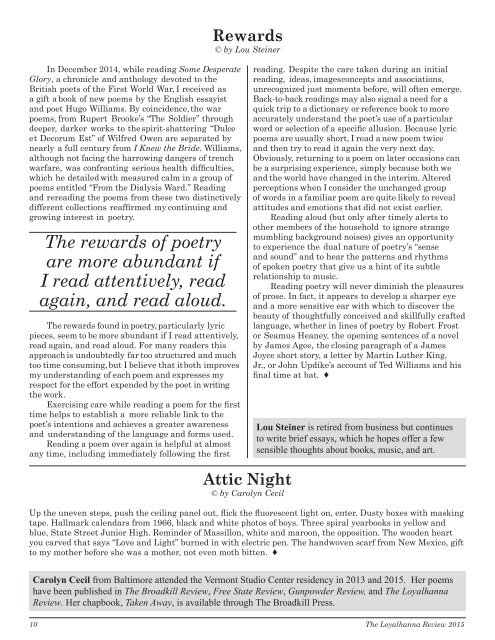The Loyalhanna Review
4eW9hgtaF
4eW9hgtaF
Create successful ePaper yourself
Turn your PDF publications into a flip-book with our unique Google optimized e-Paper software.
Rewards<br />
© by Lou Steiner<br />
In December 2014, while reading Some Desperate<br />
Glory, a chronicle and anthology devoted to the<br />
British poets of the First World War, I received as<br />
a gift a book of new poems by the English essayist<br />
and poet Hugo Williams. By coincidence, the war<br />
poems, from Rupert Brooke’s “<strong>The</strong> Soldier” through<br />
deeper, darker works to the spirit-shattering “Dulce<br />
et Decorum Est” of Wilfred Owen are separated by<br />
nearly a full century from I Knew the Bride. Williams,<br />
although not facing the harrowing dangers of trench<br />
warfare, was confronting serious health difficulties,<br />
which he detailed with measured calm in a group of<br />
poems entitled “From the Dialysis Ward.” Reading<br />
and rereading the poems from these two distinctively<br />
different collections reaffirmed my continuing and<br />
growing interest in poetry.<br />
<strong>The</strong> rewards of poetry<br />
are more abundant if<br />
I read attentively, read<br />
again, and read aloud.<br />
<strong>The</strong> rewards found in poetry, particularly lyric<br />
pieces, seem to be more abundant if I read attentively,<br />
read again, and read aloud. For many readers this<br />
approach is undoubtedly far too structured and much<br />
too time consuming, but I believe that it both improves<br />
my understanding of each poem and expresses my<br />
respect for the effort expended by the poet in writing<br />
the work.<br />
Exercising care while reading a poem for the first<br />
time helps to establish a more reliable link to the<br />
poet’s intentions and achieves a greater awareness<br />
and understanding of the language and forms used.<br />
Reading a poem over again is helpful at almost<br />
any time, including immediately following the first<br />
reading. Despite the care taken during an initial<br />
reading, ideas, images concepts and associations,<br />
unrecognized just moments before, will often emerge.<br />
Back-to-back readings may also signal a need for a<br />
quick trip to a dictionary or reference book to more<br />
accurately understand the poet’s use of a particular<br />
word or selection of a specific allusion. Because lyric<br />
poems are usually short, I read a new poem twice<br />
and then try to read it again the very next day.<br />
Obviously, returning to a poem on later occasions can<br />
be a surprising experience, simply because both we<br />
and the world have changed in the interim. Altered<br />
perceptions when I consider the unchanged group<br />
of words in a familiar poem are quite likely to reveal<br />
attitudes and emotions that did not exist earlier.<br />
Reading aloud (but only after timely alerts to<br />
other members of the household to ignore strange<br />
mumbling background noises) gives an opportunity<br />
to experience the dual nature of poetry’s “sense<br />
and sound” and to hear the patterns and rhythms<br />
of spoken poetry that give us a hint of its subtle<br />
relationship to music.<br />
Reading poetry will never diminish the pleasures<br />
of prose. In fact, it appears to develop a sharper eye<br />
and a more sensitive ear with which to discover the<br />
beauty of thoughtfully conceived and skillfully crafted<br />
language, whether in lines of poetry by Robert Frost<br />
or Seamus Heaney, the opening sentences of a novel<br />
by James Agee, the closing paragraph of a James<br />
Joyce short story, a letter by Martin Luther King,<br />
Jr., or John Updike’s account of Ted Williams and his<br />
final time at bat. ♦<br />
Lou Steiner is retired from business but continues<br />
to write brief essays, which he hopes offer a few<br />
sensible thoughts about books, music, and art.<br />
Attic Night<br />
© by Carolyn Cecil<br />
Up the uneven steps, push the ceiling panel out, flick the fluorescent light on, enter. Dusty boxes with masking<br />
tape. Hallmark calendars from 1966, black and white photos of boys. Three spiral yearbooks in yellow and<br />
blue, State Street Junior High. Reminder of Massillon, white and maroon, the opposition. <strong>The</strong> wooden heart<br />
you carved that says “Love and Light” burned in with electric pen. <strong>The</strong> handwoven scarf from New Mexico, gift<br />
to my mother before she was a mother, not even moth bitten. ♦<br />
Carolyn Cecil from Baltimore attended the Vermont Studio Center residency in 2013 and 2015. Her poems<br />
have been published in <strong>The</strong> Broadkill <strong>Review</strong>, Free State <strong>Review</strong>, Gunpowder <strong>Review</strong>, and <strong>The</strong> <strong>Loyalhanna</strong><br />
<strong>Review</strong>. Her chapbook, Taken Away, is available through <strong>The</strong> Broadkill Press.<br />
10 <strong>The</strong> <strong>Loyalhanna</strong> <strong>Review</strong> 2015


